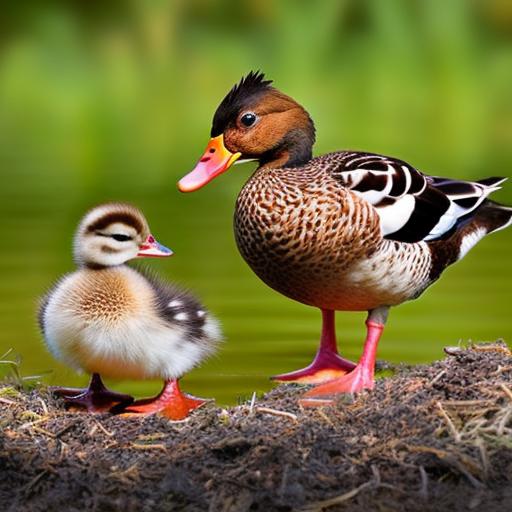Raising baby ducks and chickens together has become a popular trend among backyard farmers. It offers a unique and diverse flock that can provide a range of benefits. While ducks and chickens have their differences, they can cohabitate successfully with proper care and consideration.
Many backyard farmers are drawn to the idea of raising ducks and chickens together because it allows them to have a more diverse flock. Ducks and chickens have different behaviors, personalities, and physical characteristics, which can add variety and interest to the farm. Additionally, both ducks and chickens are known for their ability to provide eggs and meat, making them valuable additions to any backyard farm.
Key Takeaways
- Raising baby ducks and chickens together can be a rewarding experience.
- Ducks and chickens have different needs and behaviors that should be understood before keeping them together.
- Keeping ducks and chickens together can provide benefits such as pest control and companionship.
- Factors such as space, predator protection, and feeding requirements should be considered before keeping ducks and chickens together.
- Choosing the right breed of ducks and chickens for your flock is important for their compatibility and health.
Understanding the Differences Between Ducks and Chickens
Ducks and chickens have distinct physical and behavioral differences that should be taken into account when considering raising them together. Ducks are generally larger than chickens, with webbed feet and waterproof feathers. They are also known for their love of water and their ability to swim. Chickens, on the other hand, have claws instead of webbed feet and lack the waterproof feathers that ducks possess.
In terms of behavior, ducks are more social than chickens and tend to form tight-knit groups. They also have a tendency to be more active during the night, while chickens are diurnal animals that are most active during the day. These differences in behavior can affect their cohabitation, as ducks may disturb chickens during their resting periods or vice versa.
Benefits of Keeping Ducks and Chickens Together
Keeping ducks and chickens together can provide mutual benefits for both species. Ducks are known for their ability to forage for insects, snails, slugs, and other pests in the garden. By allowing ducks to roam freely with chickens, they can help control pests in the area, reducing the need for chemical pesticides.
Chickens, on the other hand, are excellent at scratching the ground and turning it over. This behavior helps to aerate the soil and can be beneficial for the ducks, as it creates a more suitable environment for them to find insects and other food sources. Additionally, chickens can provide protection for the ducks by alerting them to potential predators.
Factors to Consider Before Keeping Ducks and Chickens Together
Before deciding to keep ducks and chickens together, there are several factors that need to be considered. One of the most important factors is space requirements. Ducks require more space than chickens, both in terms of their living quarters and their outdoor area. They need access to water for swimming, which should be deep enough for them to fully submerge their bodies.
Feeding and watering needs should also be taken into account. Ducks have different dietary requirements than chickens and need access to water at all times. They also require a higher protein diet, especially during their growing stages. Providing separate feeding and watering stations for ducks and chickens can help ensure that each species gets the nutrition they need.
Potential health concerns should also be considered when keeping ducks and chickens together. Ducks are more susceptible to certain diseases, such as botulism, which can be transmitted through contaminated water sources. It is important to regularly clean and maintain water sources to prevent the spread of diseases. Additionally, ducks can carry parasites that may affect chickens, so regular monitoring and treatment may be necessary.
Choosing the Right Breed of Ducks and Chickens for Your Flock
When choosing breeds of ducks and chickens to raise together, it is important to consider their compatibility and specific needs. Some breeds of ducks are more social and adaptable than others, making them better suited for cohabitation with chickens. Muscovy ducks, for example, are known for their calm temperament and ability to get along well with other poultry.
For chickens, certain breeds may be more tolerant of ducks and their behaviors. Breeds such as Rhode Island Reds and Plymouth Rocks are known for their docile nature and ability to coexist with other poultry. It is important to research and choose breeds that are known for their compatibility with both ducks and chickens.
Housing Requirements for Baby Ducks and Chickens

Providing appropriate housing for baby ducks and chickens is essential for their safety and well-being. Coops should be spacious enough to accommodate both species comfortably, with separate areas for nesting and roosting. Ducks will require access to water, so a small pool or pond should be provided within the coop or in the outdoor area.
The run should be securely fenced to prevent predators from entering and to keep the ducks and chickens contained. It is important to ensure that the fencing is tall enough to prevent the ducks from flying over it, as they are capable of flight. Additionally, the flooring of the coop should be covered with straw or wood shavings to provide a comfortable surface for both species.
Feeding Requirements for Baby Ducks and Chickens
Ducks and chickens have different dietary needs, so it is important to provide proper nutrition for both species. Ducks require a higher protein diet, especially during their growing stages. They also need access to water at all times, as they use it not only for drinking but also for preening their feathers.
Chickens, on the other hand, have lower protein requirements and can thrive on a diet that consists mainly of grains and vegetables. However, it is important to provide a balanced diet that includes all necessary nutrients. Separate feeding stations should be provided for ducks and chickens to ensure that each species gets the appropriate food.
Health Concerns When Keeping Ducks and Chickens Together
When keeping ducks and chickens together, there are potential health concerns that need to be addressed. Ducks are more susceptible to certain diseases, such as botulism, which can be transmitted through contaminated water sources. Regular cleaning and maintenance of water sources can help prevent the spread of diseases.
Ducks can also carry parasites that may affect chickens. Regular monitoring and treatment for parasites, such as mites and lice, should be implemented to ensure the health of both species. It is also important to provide a clean and dry environment for both ducks and chickens to prevent the development of bacterial and fungal infections.
Tips for Raising Healthy and Happy Ducks and Chickens Together
To ensure the health and happiness of both ducks and chickens, there are several best practices that should be followed. Providing ample space for both species to roam and exercise is essential. Ducks require access to water for swimming, so a small pool or pond should be provided within the outdoor area.
Regular monitoring of both ducks and chickens for signs of illness or injury is important. Any abnormalities should be addressed promptly to prevent the spread of disease or further complications. Additionally, providing enrichment activities, such as toys or treats, can help keep both species mentally stimulated and entertained.
Can You Keep Baby Ducks and Chickens Together?
In conclusion, raising baby ducks and chickens together can be a rewarding experience for backyard farmers. It offers a diverse flock that can provide a range of benefits, including pest control and soil aeration. However, it is important to consider the differences between ducks and chickens, as well as the specific needs of each species.
Proper housing, feeding, and health care are essential for the successful cohabitation of ducks and chickens. By providing appropriate living conditions and nutrition, as well as regular monitoring for signs of illness or injury, both species can thrive together. With careful consideration and proper care, raising baby ducks and chickens together can be a great addition to any backyard farm.
If you’re considering keeping baby ducks and chickens together, it’s important to understand the unique needs of each species. While they can coexist harmoniously, there are certain considerations to keep in mind. In a related article on Poultry Wizard, you can find valuable information on how to create the ideal environment for your feathered friends. From tips on providing a heater for a chicken coop to exploring large chicken coop ideas and determining the best location for your setup, this article covers all the essentials. Check it out here to ensure the well-being and happiness of your baby ducks and chickens.
FAQs
What is the difference between baby ducks and chickens?
Baby ducks and chickens are different species of birds. Ducks are waterfowl and have webbed feet, while chickens are land birds and have claws. Ducks also have a more streamlined body shape and a flat bill, while chickens have a rounder body shape and a pointed beak.
Can baby ducks and chickens be kept together?
Yes, baby ducks and chickens can be kept together as long as they are of similar size and age. However, it is important to provide them with appropriate housing and care to ensure their health and safety.
What kind of housing do baby ducks and chickens need?
Baby ducks and chickens need a secure and dry shelter that protects them from predators and the elements. The shelter should have a heat source, such as a heat lamp, to keep them warm. It should also have a clean and dry bedding material, such as straw or wood shavings.
What do baby ducks and chickens eat?
Baby ducks and chickens require a balanced diet that includes a mix of protein, carbohydrates, and vitamins and minerals. They can be fed a commercial chick starter feed that is specifically formulated for their nutritional needs. They can also be given treats such as fruits and vegetables, but these should be given in moderation.
What are some common health issues for baby ducks and chickens?
Common health issues for baby ducks and chickens include respiratory infections, parasites, and injuries. It is important to monitor their health and behavior regularly and seek veterinary care if necessary. Good hygiene practices, such as keeping their living area clean and dry, can also help prevent health issues.
Meet Walter, the feathered-friend fanatic of Florida! Nestled in the sunshine state, Walter struts through life with his feathered companions, clucking his way to happiness. With a coop that’s fancier than a five-star hotel, he’s the Don Juan of the chicken world. When he’s not teaching his hens to do the cha-cha, you’ll find him in a heated debate with his prized rooster, Sir Clucks-a-Lot. Walter’s poultry passion is no yolk; he’s the sunny-side-up guy you never knew you needed in your flock of friends!







